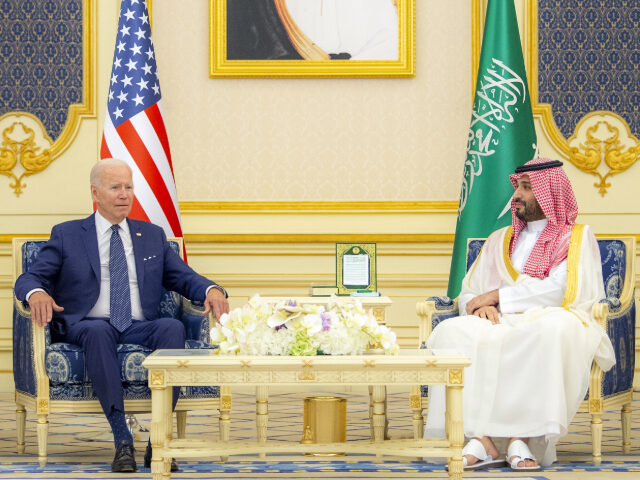The State Department announced on Saturday that it would lift a three-year ban on selling certain weapons to Saudi Arabia, allowing some $750 million worth of bombs to be sold to the Saudi kingdom within the next few months.
“The deliveries will include 3,000 Small Diameter Bombs and 7,500 Paveway IV bombs, which have been on hold since President Biden halted the shipments in 2021 over Saudi Arabia’s punishing war in Yemen,” the Wall Street Journal reported on Tuesday.
The ban was imposed at a time when the Biden administration was trying to pressure the Saudis to wind down their long military intervention in the Yemen civil war. The Iran-backed Houthi terrorists of Yemen overthrew the legitimate government in 2014, touching off a civil war that did not simmer down until the United Nations brokered a truce in 2022.
The Saudis assembled a coalition of Gulf states and intervened on behalf of the Yemeni government in 2015, a war effort that proved to be as brutal as the Houthi insurgency. International media rarely call out the Houthis for their war crimes, which include terrorism, mass killings, and using child soldiers, but the Saudi coalition came under tremendous international pressure for causing excessive civilian casualties with its bombing campaign.
President Joe Biden campaigned against the Saudi war in Yemen in 2020, in addition to other human rights abuses, such as the killing of writer Jamal Khashoggi in 2018. Biden vowed to make the Saudis “pay a price” and turn them into the “pariah they are.”
These words came back to haunt Biden when he needed Saudi help to control rising gas prices in the United States. Biden ultimately adjusted his public opinion of the Saudi monarchy and found his own reasons to drop bombs on the Houthis, but only now is the embargo on bombs — imposed in 2021 against the backdrop of the Saudi war in Yemen — being lifted.
The State Department said the embargo would be lifted due to “positive steps that the Saudi Ministry of Defense have taken over the past three years to substantially improve their civilian harm mitigation processes, in part thanks to the work of U.S. trainers and advisers.”
Center for Strategic and International Studies (CSIS) Senior Vice President Jon Alterman told the Journal that the ban on air-to-ground munitions was lifted to “reward Saudi Arabia for its support on regional security issues, including but not limited to their openness to long-term normalization with Israel.”
Alterman said the Biden administration also wanted to send the Houthis a signal that “there is less daylight between the Saudis and the U.S.,” thanks to the Houthi campaign of terror attacks against Red Sea shipping.
“The Saudis have met their end of the deal, and we are prepared to meet ours, returning these cases to regular order through appropriate congressional notification and consultation,” said a senior administration official.
The Saudi “end of the deal” involved de-escalation in Yemen and greater care taken to avoid civilian casualties in future conflicts. The Saudis also reportedly helped intercept Iran’s drone and missile attack on Israel in April.
The Times of Israel on Monday suggested the Saudis are making progress toward securing a grand bargain of “U.S. security guarantees, a continued flow of weapons and potentially a civilian nuclear deal” if they normalize relations with Israel.
Some Democrats still complain about the Saudi record on human rights, but the Biden team clearly wants Saudi help with de-escalation in Gaza and other issues in the powder-keg Middle East.
“I supported the Biden administration’s initial decision to pause offensive arms sales to Saudi Arabia, and I hope to see compelling evidence that Saudi Arabia has changed its conduct,” Rep. Joaquin Castro (D-TX) told the Times.

COMMENTS
Please let us know if you're having issues with commenting.